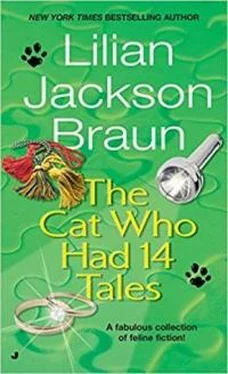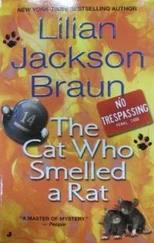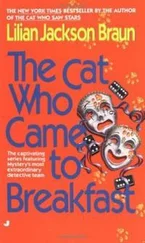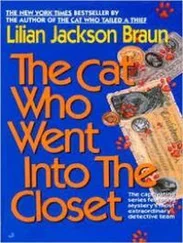“Nervous? I’m not nervous. Besides, it was your idea to invite your clients and my friends at the same time. You said we should kill a whole blasted flock of birds with one blasted stone . . . . Now, please. John, are you going to feed Phuffy? He’s staring at me and making my head ache.”
Phut Phat scarcely had time to swallow his creamed liver, wash his face, and arrange himself on the living room mantel before people started to arrive. His irritation at the disrupted routine was lessened somewhat by the prospect of being admired by the guests. His name meant “beautiful” in Siamese, and he was well aware of his pulchritude. Lounging between a pair of Georgian silver candlesticks, with one foreleg extended and the other exquisitely bent under at the ankle, with his head erect and gaze withdrawn, with his tail drooping nonchalantly over the edge of the marble mantel, he awaited compliments.
It was a large party, and Phut Phat observed that very few of the guests knew how to pay their respects to a cat. Some talked nonsense in a false voice. Others made startling movements in his direction, or worse still, tried to pick him up.
There was one knowledgeable man, however, who approached with the proper attitude of deference and reserve. Phut Phat squeezed his eyes in appreciation. The admirer was a distinguished-looking man who leaned heavily on a shiny stick. Standing at a respectful distance, he slowly held out his hand with one finger extended, and Phut Phat twitched his whiskers politely.
“You are a living sculpture,” said the man.
“That’s Phut Phat,” said ONE, who had pushed through the crowded room toward the fireplace. “He’s the head of our household.”
“He is obviously of excellent stock,” said the man with the shiny cane, addressing his hostess in the same courtly manner that had charmed Phut Phat.
“Yes, he could probably win ribbons if we wanted to enter him in shows, but he’s strictly a pet. He never goes out except in his coop on the fire escape.”
“A splendid idea!” said the guest. “I should like such an arrangement for my own cat. She’s a tortoiseshell longhair. May I inspect this coop before I leave?”
“Certainly. It’s just outside the library window.”
“You have a most attractive house.”
“Thank you. We’ve been accused of decorating it to complement Phut Phat’s coloring, which is somewhat true. You’ll notice we have no breakable bric-a-brac. When he flies through the air, he recognizes no obstacles.”
“Indeed, I have noticed you collect Georgian silver,” the man said. “You have some fine examples.”
“Apparently you know silver. Your cane is a rare piece.”
He frowned in self-pity. “An attempt to extract a little pleasure from a sorry necessity.” He hobbled a step or two.
“Would you like to see my silver collection downstairs in the dining room?” asked ONE. “All early examples, around the time of Wren.”
Phut Phat, aware that the conversation no longer centered on his superlative qualities, jumped down from the mantel and stalked out of the room with several irritable flicks of the tail. He found an olive and pushed it down the heat register. Several feet stepped on him. In desperation he went upstairs to the guest room, where he discovered a mound of sable and mink and went to sleep.
After this upset in the household routine Phut Phat needed several days to catch up on his rest, so the coming week was a sleepy blur. But soon it was Sunday again, with creamed liver for breakfast, Sunday papers scattered over the floor, and everyone lounging around being pleasantly routine.
“Phuffy! Don’t roll on those newspapers,” said ONE. “John, the ink rubs off on his fur. Give him the Wall Street Journal; it’s cleaner.”
“Maybe he’d like to go out into his coop and get some sun.”
“That reminds me, dear. Who was that charming man with the silver cane at our party? I didn’t catch his name.”
“I don’t know,” said TWO. “I thought he was someone you invited.”
“Well, he must have come with one of the other guests. At any rate, he was interested in getting a coop like ours. He has a long-haired torty. And did I tell you the Hendersons have two Burmese kittens? They want us to go over and see them next Sunday and have a drink.”
Another week passed, during which Phut Phat discovered a new perch. He found he could jump to the top of an antique armoire—a towering piece of furniture in the hall outside the library. Otherwise it was a routine week, followed by a routine weekend, and Phut Phat was content.
ONE and TWO were going out on Sunday evening to see the Burmese kittens, so Phut Phat was served an early dinner, after which he fell asleep on the library sofa.
When the telephone rang and waked him, it was dark and he was alone. He raised his head and chattered at the instrument until it stopped its noise. Then he went back to sleep, chin on paw.
The second time the telephone started ringing, Phut Phat stood up and scolded it, arching his body in a vertical stretch and making a question mark with his tail. To express his annoyance he hopped on the desk and sharpened his claws on Webster’s Unabridged. Then he spent quite some time chewing on a leather bookmark. After that he felt thirsty. He sauntered toward the powder room for a drink.
No lights were on, and no moonlight came through the windows, yet he moved through the dark rooms with assurance, sidestepping table legs and stopping to examine infinitesimal particles on the hall carpet. Nothing escaped his attention.
Phut Phat was lapping water, the tip of his tail was waving rapturously, when something caused him to raise his head and listen. His tail froze. Sparrows in the backyard? Rain on the fire escape? There was silence again. He lowered his head and resumed his drinking.
A second time he was alerted. Something was happening that was not routine. His tail bushed like a squirrel’s, and with his whiskers full of alarm he stepped noiselessly into the hall, peering toward the library.
Someone was on the fire escape. Something was gnawing at the library window.
Petrified, he watched—until the window opened and a dark figure slipped into the room. With one lightning glide Phut Phat sprang to the top of the tall armoire.
There on his high perch, able to look down on the scene, he felt safe. But was it enough to feel safe? His ancestors had been watch-cats in Oriental temples centuries before. They had hidden in the shadows and crouched on high walls, ready to spring on any intruder and tear his face to ribbons—just as Phut Phat shredded the Sunday paper. A primitive instinct rose in his breast, but quickly it was quelled by civilized inhibitions.
The figure in the window advanced stealthily toward the hall, and Phut Phat experienced a sense of the familiar. It was the man with the shiny stick. This time, though, his presence smelled sinister. A small blue light now glowed from the head of the cane, and instead of leaning on it, the man pointed it ahead to guide his way out of the library and toward the staircase. As the intruder passed the armoire, Phut Phat’s fur rose to form a sharp ridge down his spine. Instinct said: “Spring at him!” But vague fears held him back.
With feline stealth the man moved downstairs, unaware of two glowing diamonds that watched him in the blackness, and Phut Phat soon heard noises in the dining room. He sensed evil. Safe on top of the armoire, he trembled.
When the man reappeared he was carrying a bulky load, which he took to the library window. Then he crept to the third floor, and there were muffled sounds in the bedroom. Phut Phat licked his nose in apprehension.
Now the man reappeared, following a pool of blue light. As he approached the armoire, Phut Phat shifted his feet, bracing himself against something invisible. He felt a powerful compulsion to attack, and yet a fearful dismay.
Читать дальше












